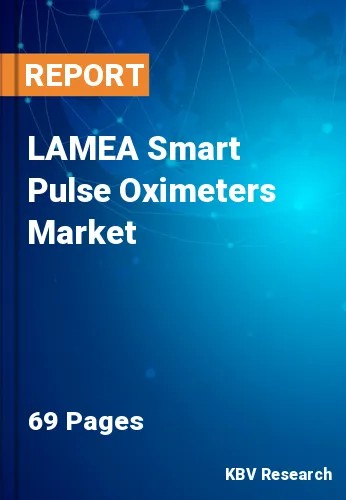The Latin America, Middle East and Africa Smart Pulse Oximeters Market would witness market growth of 10.2% CAGR during the forecast period (2022-2028).
Fingertip, handheld, wrist-worn, and pediatric pulse oximeters are all examples of smart pulse oximeters. In medical institutes and hospitals, a handheld smart pulse oximeter is commonly and widely utilized to continuously track patients. When compared to its traditional equivalents, it is more complex. The screen is not joined to the clip; instead, the clip is connected to the screen through a wire. Apart from the oxygenated blood level, the screen also shows additional diagnostic information. The reading of this instrument is taken using infrared radiation.
When the amount of oxygen in the blood falls below ideal levels, hypoxemia occurs. It is a concern during surgery when anesthesia or other medicines influence the patient's respiration and ventilation. Pulse oximetry is frequently used by medical staff to monitor patients during and after surgery.
There is inter-and intra-regional variation in asthma prevalence in the Middle East. In Saudi Arabia, the frequency was reported to be 23.6 percent, in Qatar, 19.8 percent, and in Oman, the prevalence ranged from 7.8 percent to 17.3 percent depending on the location. According to the AIRGNE data, asthma causes sickness absenteeism in 30 percent of adults and 52 percent of children each year. Since an asthma attack with an oxygen saturation of less than 92 percent is deemed a severe asthma attack, oxygen levels are regularly monitored. Hypoxia is the leading cause of death in asthma patients. As a result, it's critical to keep track of oxygen levels in all asthmatics admitted to the ER. Therefore, the market for smart pulse oximeters is expected to increase in the upcoming years.
For UAE nationals and tourists from other countries, especially those from the Middle East and Africa, who go to the UAE on medical tourist visas, the UAE has made considerable investments in the establishment of world-class medical facilities with high treatment standards. According to the World Health Organization, one-third of adults in the UAE are obese, and one out of every five persons has diabetes. As the prevalence of lifestyle diseases rises, these people will want better healthcare. To meet this need, the government is concentrating its efforts on strengthening healthcare infrastructure, which will increase the use of smart pulse oximeters across the region.
The Brazil market dominated the LAMEA Smart Pulse Oximeters Market by Country in 2021, and would continue to be a dominant market till 2028; thereby, achieving a market value of $35.8 Million by 2028. The Argentina market is estimated to grow at a CAGR of 10.7% during (2022 - 2028). Additionally, The UAE market would witness a CAGR of 9.9% during (2022 - 2028).
Based on Type, the market is segmented into Fingertip, Hand held, Wrist worn, and Pediatric. Based on End User, the market is segmented into Hospitals & Clinics, Ambulatory Surgical Centers, and Home Environment. Based on countries, the market is segmented into Brazil, Argentina, UAE, Saudi Arabia, South Africa, Nigeria, and Rest of LAMEA.
Free Valuable Insights: The Global Smart Pulse Oximeters Market is Predict to reach $2.4 Billion by 2028, at a CAGR of 7.6%
The market research report covers the analysis of key stake holders of the market. Key companies profiled in the report include Masimo Corporation. Koninklijke Philips N.V., Medtronic PLC, Omron Corporation, Smiths Group PLC, Contec Medical Systems Co., Ltd., Meditech Equipment Co .,Ltd (Meditech Group), Nonin Medical, Inc., Promed Technology Co., Ltd., and Tenko Medical System Corp.
By Type
By End User
By Country
Our team of dedicated experts can provide you with attractive expansion opportunities for your business.

